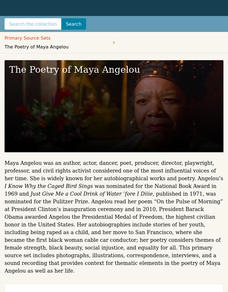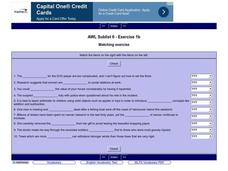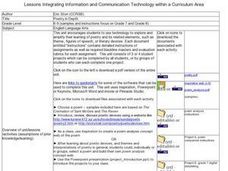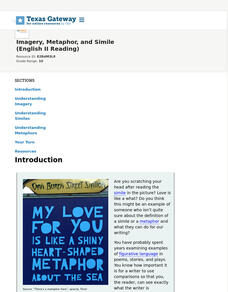EngageNY
Mid-Unit Assessment and Discussing Themes in Esperanza Rising: (Chapter 9: "Las Ciruelas/PLums")
Give this skills-based assessment halfway through your unit on Esperanza Rising. After a brief review, class members take the test, which asks them to show that they know how to analyze the novel independently. They are asked to...
EngageNY
Rereading and Close Reading: Communism, “The Vietnam Wars,” and “Last Respects” (Pages 85 and 86)
What might a papaya symbolize? Using the resource, scholars look for examples of symbolism in the novel Inside Out & Back Again. They also participate in a silent discussion called a Chalk Talk, writing their responses to a...
EngageNY
Inferring About Character: Atticus (Chapter 5)
As part of their study of Harper Lee's To Kill a Mockingbird, class members participate in a silent discussion of the novel using a Chalk Talk chart. They then respond to the teacher's questions by writing their thoughts on the chart....
University of North Carolina
Clichés
When it comes to writing, cliches are as old as dirt. A handout on tired phrases provides examples of cliches, as well as a description of the negative effects they have on a paper. Writers discover specific words and phrases to avoid,...
EngageNY
Grade 9 ELA Module 1, Unit 1, Lesson 6
Can you tell everything about a character based on their actions? Delve into the prominent characters of Karen Russell's "St. Lucy's Home for Girls Raised by Wolves" with helpful reading tips and discussion questions. A thorough lesson...
EngageNY
Analyzing Poems from Inside Out and Back Again to Develop Criteria for an Effective Poem
Scholars analyze a model poem to help guide their poetry writing. They use Think-Pair-Share to discuss word choice and meaning in "Papaya Tree" and "Wet and Crying." To finish, they use their discussions to collect evidence on what makes...
EngageNY
Character Analysis: Resilience
A Three Threes in a Row note catcher enables class members to dig deeper into the theme in Unbroken. They work with partners for 10 minutes and then rotate around the room to work with others. After regrouping and class discussion,...
EngageNY
Grade 11 ELA Module 1: Unit 2, Lesson 11
What is Hamlet's attitude towards life and death in Shakespeare's Hamlet? Scholars continue reading the play to answer the question, paying particular attention to Hamlet's most famous soliloquy. By holding a discussion and completing...
Digital Public Library of America
The Poetry of Maya Angelou
Maya Angelou's work reflects her passion for life, civil rights, and justice for all. A collection of 12 primary sources provide scholars with insight into this amazing woman. The set includes photographs, articles, recordings of...
Curated OER
English Vocabulary Skills: AWL Sublist 8 - Exercise 6b
In this online interactive English vocabulary skills worksheet, students answer 10 matching questions which require them to fill in the blanks in 10 sentences. Students may submit their answers to be scored.
Curated OER
Poetry Interpretation and Figurative Language
Fifth graders discover how figurative language is used in poetry. They read selected poems and identify the figurative language with handouts and worksheets included in the lesson. They write poems of their own using figurative language.
Curated OER
Creating Civic Awareness Through Artistic and Literary Forms
Interpret current events using editorial cartoons and other print media. Middle schoolers explore the meanings of literary and artistic terms such as satire, irony, and caricature. They visit internet sites to develop an understanding of...
Curated OER
The Language of Surprise
Aspiring writers complete and discuss fill-in-the-blank cliché expressions, define cliché as a form of predictable writing, take cliché expressions and turn them into new, unpredictable ones, read poetry that illustrates writer's use of...
Curated OER
Poetry in Depth
Scholars use technology to explore poetry and its related elements, such as theme, figures of speech, and other literary devices. They complete four poetry projects including a poem analysis with a concept web, an interactive poem...
Curated OER
Edward Lear, Limericks, and Nonsense
Introduce your class to the delights of nonsense poetry and explore literary devices with the writing of Edward Lear. Learners identify rhyme and meter as well as figures of speech, alliteration, and onomatopoeia in "The Owl and the...
Curated OER
Common Idioms 5
If you have been analyzing idioms, you can assess your learners' grasp of their figurative meanings with this 10-question matching exercise. Or you could give the sheet to groups to foster discussion about literal versus figurative...
Curated OER
What Makes Jokes Funny?
Explore how language is used for comic effect. Middle schoolers determine which of the three formulas for jokes (double meanings, unexpected outcome, humorous mental image) make each of 18 classic, corny examples funny. They complete a...
Curated OER
Let's Focus on Idioms
Get online and explore idioms. Your class will use the Internet to locate, choose, and illustrate their favorite idioms. They make a class PowerPoint with illustrations for their idioms and explain the meaning of each. A great way to...
K12 Reader
Finish the Proverbs and Adages
How many common idioms do you know? Test your knowledge with a set of ten phrases to complete. The idioms range in difficulty level, making it a good challenge for even advanced readers.
E Reading Worksheets
Poetic Devices Finder
Track the poetic elements in any text with a guided reading worksheet. Kids note examples of consonance, alliteration, onomatopoeia, repetition, rhyme, and rhythm when reading a poem or story, and provide a short explanation as to why...
Texas Education Agency (TEA)
Imagery, Metaphor, and Simile (English II Reading)
The sixth interactive in this series introduces learners to the power of figurative language. After studying examples of similes and metaphors, readers examine how such comparisons help them see through a writer's eyes. Interactive...
Curated OER
Practice Book O
Whether you need resources for reading comprehension, literary analysis, phonics, vocabulary, or text features, an extensive packet of worksheets is sure to fit your needs. Based on a fifth-grade curriculum but applicable to any level of...
Curated OER
A Seashell Lesson: Writing for Detail and the Scientific Process
Practice descriptive language in this lesson, which prompts elementary and middle schoolers to write detailed descriptive sentences describing a seashell. They write a description of a shell, create an illustration, and other students...
Curated OER
Poetry Writing Unit: Writing a Film Poem
Film poems? To concluded a poetry unit, writers select one of their own poems and create a film that brings to life the sounds and images of their work. Included with the detailed unit plan are daily lessons, student examples, a list of...

























